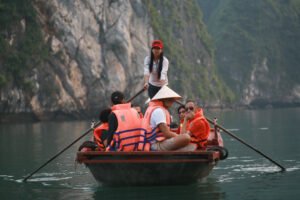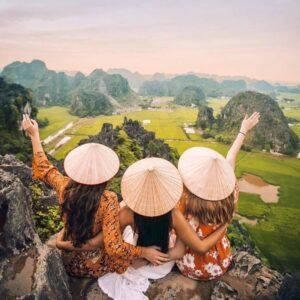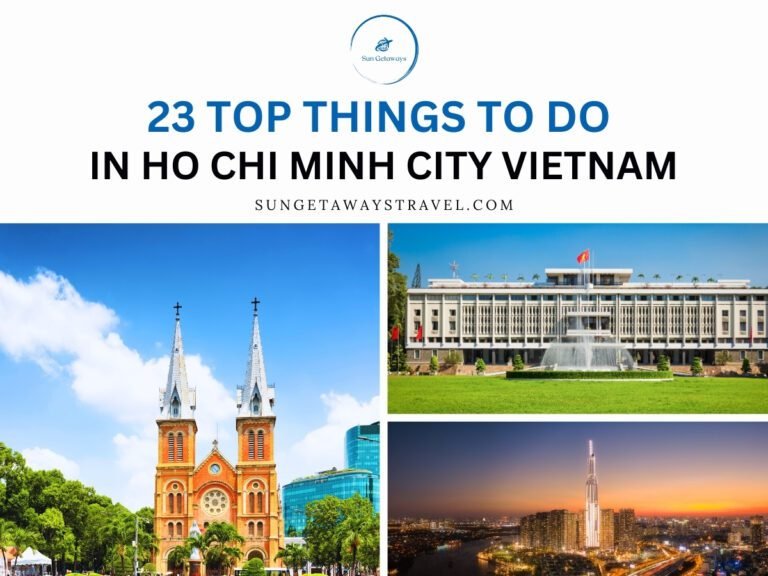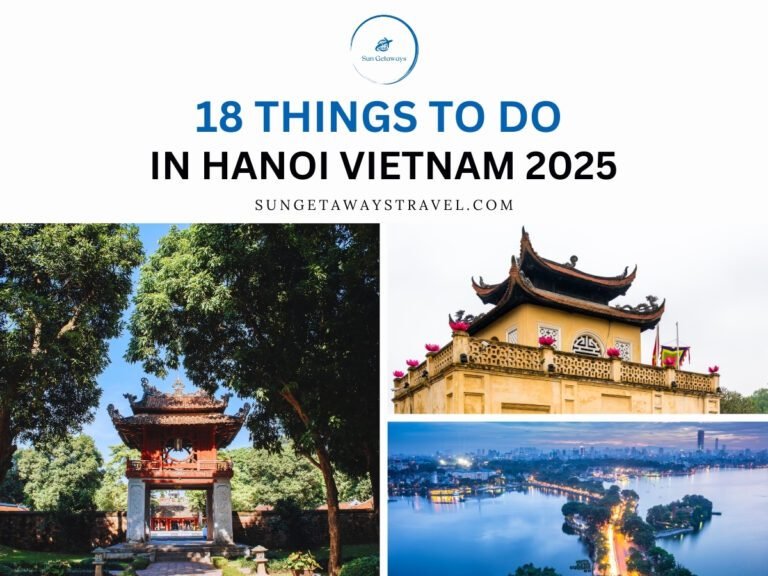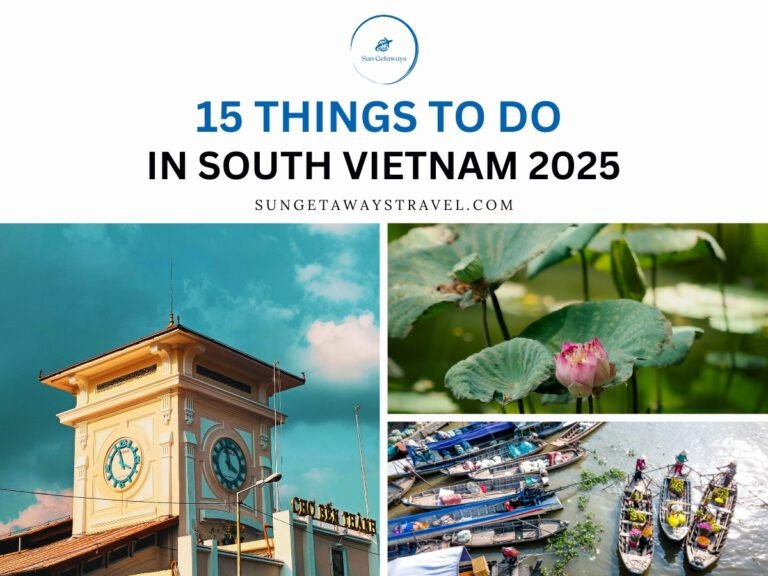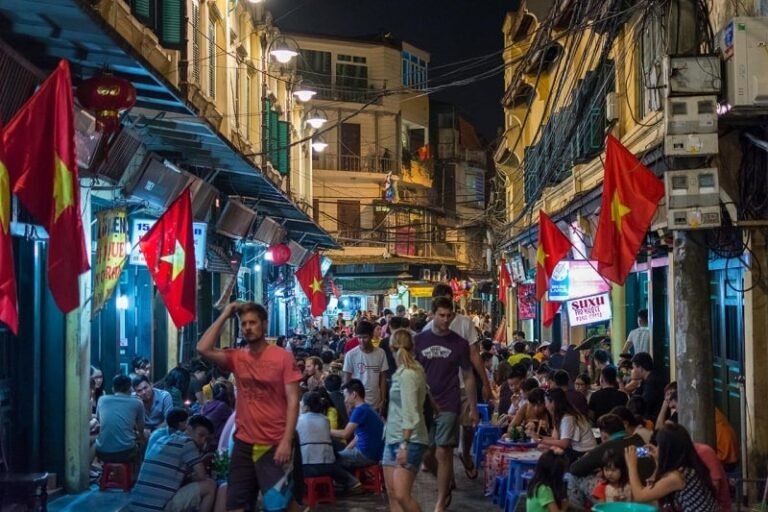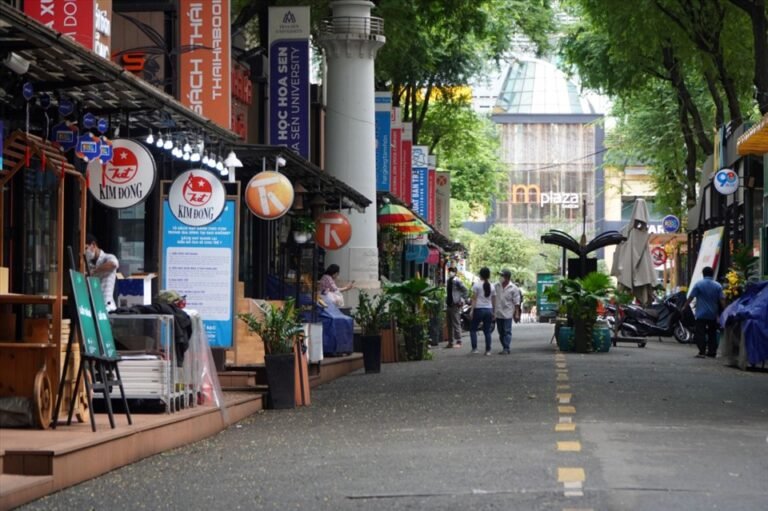Sustainable Tourism Vietnam Guide: Your Eco-Friendly Planner
Vietnam, a country of staggering beauty, sweeps from the mist-laden mountains of the north to the fertile labyrinth of the Mekong Delta in the south. Its landscapes are a vibrant tapestry of emerald rice paddies, dense jungles, and pristine coastlines. But beyond the breathtaking scenery lies a deeper story—one of ancient cultures, resilient communities, and fragile ecosystems.
For the conscious explorer, the modern traveler, there exists a beautiful dilemma: the deep desire to witness this wonder versus the awareness of the footprint our journey leaves behind. How do we explore without exploiting? How do we connect without consuming? The answer lies in a more thoughtful approach to travel. This is the heart of sustainable tourism Vietnam.
This guide is your compass for navigating the incredible world of Vietnam green travel. We’re moving beyond the well-trodden path to uncover experiences that are not only beautiful but also meaningful, offering a solution to the traveler’s dilemma.

Imagine trekking through ancient forests with a local guide whose family has protected it for generations, sharing a home-cooked meal in a highland village where your stay helps fund a child’s education, or kayaking silently through a protected wetland teeming with life. This is authentic Vietnam travel—a journey where adventure meets responsibility, and where your visit becomes a regenerative force, contributing directly to preserving the magic of this land for generations to come. Join us as we explore how to travel with purpose.
Key Takeaways for Green Travel in Vietnam
- Prioritize Local & Authentic Experiences: The core of responsible travel Vietnam is connection. Choose family-run homestays over large resorts, hire local guides, eat at small eateries, and buy directly from artisans. Your investment in the local economy is the most powerful tool for positive change, ensuring your money stays within the community.
- Minimize Your Footprint, Maximize Your Impact: Be conscious of your consumption. Carry a reusable water bottle (ideally with a filter) and a coffee cup, refuse single-use plastics like straws and bags, and pack light to reduce your carbon footprint. A small effort to reduce waste collectively makes a huge difference in preserving Vietnam’s natural beauty.
- Respect Cultures with Humility & Curiosity: Learn a few words of Vietnamese (“Xin chào” for hello, “Cảm ơn” for thank you), dress modestly when visiting rural villages or sacred sites, and always ask for permission before taking photos of people. Approach every interaction as a chance to learn, not just to observe. This is the foundation of ethical travel Vietnam.
- Choose Certified & Transparent Providers: Look for tour operators and lodges that are transparent about their sustainability practices. Don’t fall for “greenwashing.” A truly eco-friendly provider will proudly detail how they support their community, manage waste, and protect the environment.
Understanding Green Travel in Vietnam: Definitions & Importance
The concept of Vietnam green travel is a beautiful, multifaceted approach to exploring the country. It’s not a single idea but a combination of principles that, together, create a more positive and regenerative form of tourism. As Vietnam grapples with the challenges of rapid development, plastic pollution, and climate change, understanding these concepts is more important than ever for the conscious traveler.
Eco-tourism: Connecting with Nature Responsibly
Eco-tourism Vietnam is centered on the responsible exploration of the nation’s incredible biodiversity. It’s about low-impact travel that actively contributes to the conservation of natural habitats and wildlife. This goes beyond just visiting a pretty place; it’s about supporting the systems that keep it pretty.
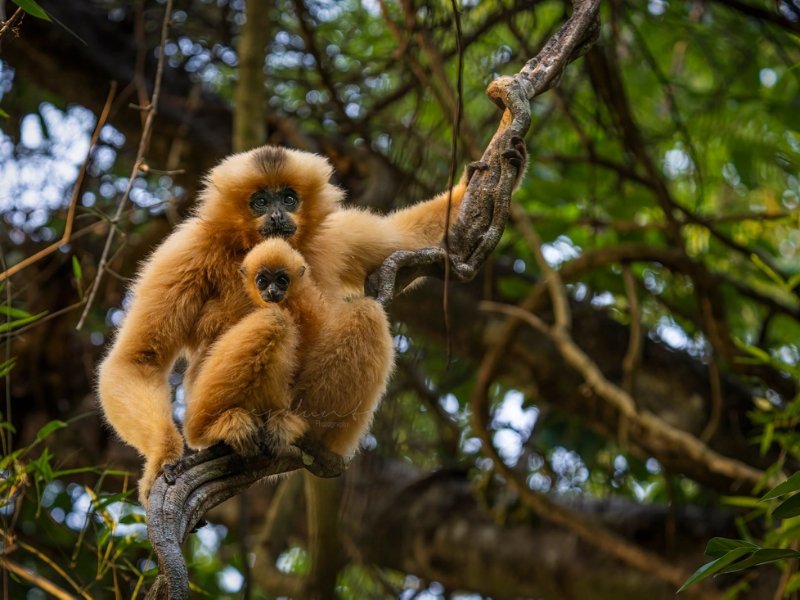

For example, the entrance fees you pay at a national park directly fund ranger patrols that combat illegal logging and poaching, protecting species like the critically endangered Black-shanked Douc Langur.
When you choose a certified eco-tour, you’re choosing a company that adheres to strict guidelines about waste disposal, wildlife interaction (i.e., observing from a respectful distance), and employing local guides who have an intimate, ancestral knowledge of the ecosystem. This form of tourism provides a powerful economic incentive for local communities to become fierce protectors of their natural heritage. Explore More:
- Best Vietnam Ecotourism Experiences for Eco-Conscious Travelers
- Vietnam National Parks: Your Ultimate Eco-Tourism Adventure
Sustainable Travel: Minimizing Your Environmental Impact
Sustainable tourism Vietnam is the broader framework that encompasses eco-tourism. It focuses on minimizing the overall environmental footprint of your journey, addressing the “how” of your travel. This includes making conscious choices about transportation; for instance, taking the scenic overnight train from Hanoi to Da Nang has a significantly lower carbon footprint than a one-hour flight.
It means staying in eco-lodges that utilize solar power, harvest rainwater, and treat their wastewater. A huge part of sustainable travel in Vietnam is tackling the plastic problem. Participating in networks like “Refill My Bottle,” widely available in cities like Hoi An and Da Nang, allows you to refill your water bottle at cafes and hotels, preventing countless plastic bottles from entering the waste stream.
Every decision, from choosing a restaurant that sources organic, local ingredients (reducing food miles) to forgoing a plastic straw, is a practical application of Vietnam eco-friendly tourism. Explore More:
- Reducing Plastic Waste While Traveling in Vietnam: A Guide for Green Journeys
- Sustainable Luxury Travel Vietnam: Eco Resorts & Ethical Tours
Responsible & Ethical Travel: Benefiting Local Communities
While eco-tourism focuses on nature, responsible travel Vietnam emphasizes the human element. It is about ensuring that tourism has a positive, empowering social and economic impact on host communities. When you stay in a family-run homestay in a Ha Giang village, your payment might directly fund a child’s school supplies or allow a family to afford healthcare.
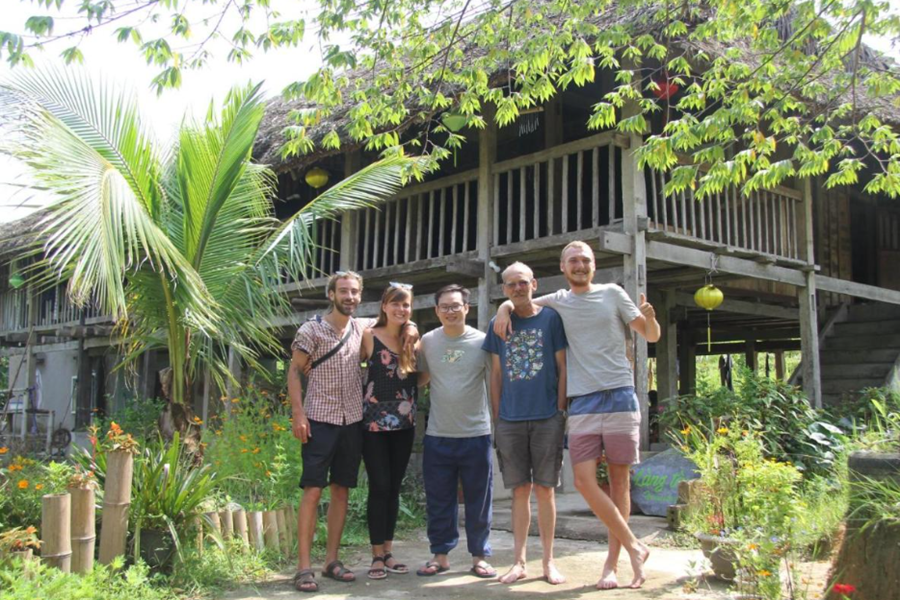

When you buy a hand-woven scarf directly from a Dao artisan at a local market, you are ensuring 100% of the profit goes to the maker, not a middleman. This direct economic empowerment is at the heart of responsible tourism. Ethical travel Vietnam is a crucial component, asking travelers to be mindful of the moral implications of their activities.
This means actively avoiding any tours that exploit animals, such as elephant rides or civet coffee (kopi luwak) farms where civets are often kept in cruel conditions. It means being aware of your privilege and interacting with local people as equals. True authentic Vietnam travel is built on a foundation of mutual respect and a genuine desire to learn and connect, not just consume. Explore More:
Top Green Destinations & Experiences in Vietnam
Vietnam is dotted with destinations where sustainability is not just a buzzword, but a way of life. Here are some of the premier locations for Vietnam eco-friendly tourism, offering a blueprint for the future of travel.
| Destination/Experience | Region | Best For | Signature Green Activities & Focus | Why It’s Sustainable |
| Cuc Phuong National Park | North | Nature Lovers, Hikers | Visiting primate, turtle, and pangolin rescue centers; biodiversity research. | Direct financial support for world-class wildlife conservation and rehabilitation programs. |
| Phong Nha-Ke Bang | Central | Adventurers, Cavers | Low-impact cave expeditions and jungle trekking. | Employs hundreds of former loggers as guides, directly funding community development. |
| Con Dao Islands | South | Beach Lovers, Divers | Strictly supervised sea turtle nesting tours; responsible snorkeling. | A protected marine sanctuary where tourism is tightly controlled to fund conservation. |
| Cham Islands | Central | Snorkelers, Conscious Travelers | Responsible diving, beach clean-ups, and community-run homestays. | A UNESCO Biosphere Reserve with a ban on plastic bags and caps on visitor numbers. |
| Ha Giang | North | Cultural Travelers, Trekkers | Multi-day homestay treks led by local ethnic minority guides. | Provides direct income to remote communities, empowering them to preserve their culture. |
| Mekong Delta | South | Foodies, Slow Travelers | Riverside homestays, cooking classes, and cycling through local orchards. | Supports small-scale family farms and businesses, moving away from mass tour models. |
| Van Long Nature Reserve | North | Wildlife Spotters, Tranquility Seekers | Peaceful boat tours to spot the critically endangered Delacour’s langur. | A low-impact tourism model where local villagers are employed directly as rowers. |
National Parks & Nature Reserves: Biodiversity Hotspots
Vietnam’s national parks are the backbone of eco-tourism Vietnam. These protected areas are vital sanctuaries for some of Southeast Asia’s rarest flora and fauna.
- Cuc Phuong National Park: As Vietnam’s first national park, established in 1962, Cuc Phuong has a long history of conservation. Beyond its lush trails and ancient trees, it houses three vital rescue centers: the Endangered Primate Rescue Center, the Turtle Conservation Centre, and the Carnivore and Pangolin Conservation Program. A visit here is a direct contribution to their incredible work. See our full guide: Cuc Phuong National Park: Trekking Through Vietnam’s First Park.
- Phong Nha-Ke Bang National Park: A UNESCO World Heritage site famous for its colossal caves and karst mountains. The park’s management works closely with tour operators to ensure expeditions are low-impact and contribute to conservation and community development, employing hundreds of local people as guides and porters who were formerly loggers. Learn more: Phong Nha-Ke Bang National Park: Caves, Jungles & Rivers.
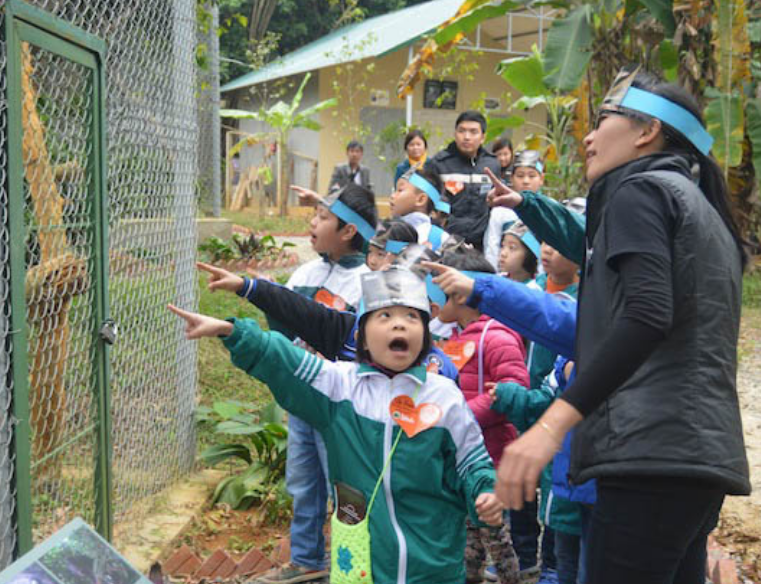



Coastal & Island Eco-Adventures: Pristine Shores & Marine Life
Vietnam’s long coastline offers incredible opportunities for marine conservation and sustainable beach travel.
- Con Dao Islands: This remote archipelago’s dark history as a political prison island inadvertently protected its nature from development for decades. Today, it’s a beacon of marine conservation. It’s the country’s most important sea turtle nesting site, and from May to October, visitors can join strictly supervised, small-group night tours to witness female turtles laying their eggs—a truly profound and humbling experience. Explore the islands’ beautiful shores: Con Dao Beaches: The Ultimate Retreat for Peace Seekers.
- Cham Islands (Cù Lao Chàm): This UNESCO Biosphere Reserve near Hoi An has pioneered community-based marine tourism. Local regulations enforce visitor caps and a ban on plastic bags to protect the fragile coral reefs. For a complete overview of Vietnam’s coastal gems, see Vietnam’s Best Beaches & Islands: Your Ultimate Guide to Coastal Paradises.
Highland Retreats & Ethnic Culture: Immersive Experiences
The mountainous regions of Northern Vietnam offer breathtaking landscapes and opportunities for deep cultural immersion through responsible travel Vietnam.
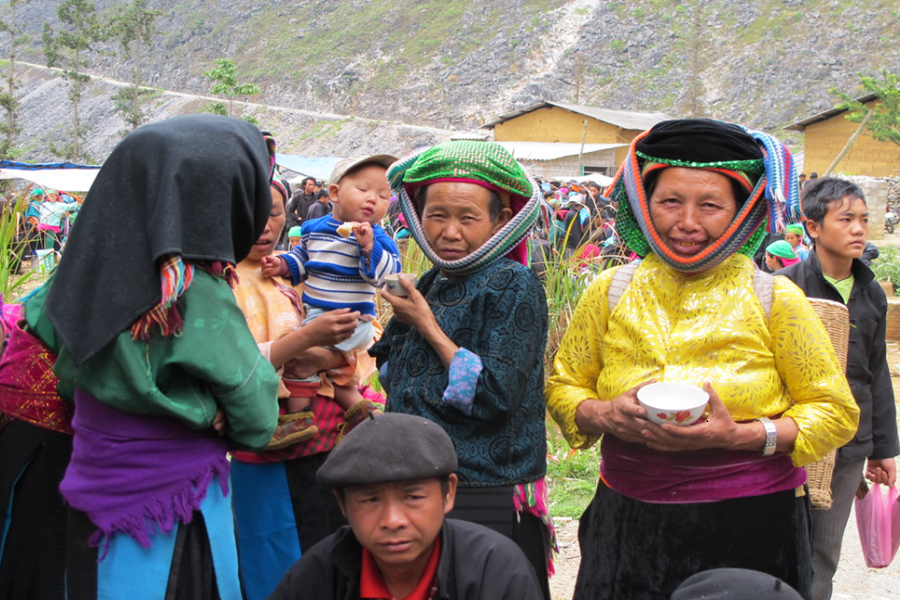

- Ha Giang: This is Vietnam’s final frontier. The dramatic landscapes of the Dong Van Karst Plateau, a UNESCO Global Geopark, are home to numerous ethnic groups, including the H’mong people. The best way to experience Ha Giang is on a multi-day trek led by a local H’mong guide. You’ll stay in their traditional stone houses, share family meals, and gain an appreciation for their resilience and deep connection to this harsh yet beautiful land. This is the essence of authentic Vietnam travel. Explore More: Sapa Trekking: Exploring Rice Terraces, Villages & Waterfalls and Ha Giang Trekking Trails: A Nature Lover’s Paradise.
Riverine & Wetland Ecosystems: Life on the Water
Vietnam’s river systems are arteries of life, shaping culture and nurturing unique ecosystems.
- Mekong Delta: Known as Vietnam’s “rice bowl,” this region is best explored slowly. Avoid large tour buses and instead opt for a small, locally-owned boat or a bicycle. Cycle along the narrow village paths, learn about the seasonality of tropical fruits like durian and rambutan from a local farmer, and stay in a riverside homestay where you can take a cooking class with your hosts. Learn more in our Exploring the Serene Splendor: Mekong Delta Travel Guide.
- Van Long Nature Reserve: Located in Ninh Binh, this is the largest wetland reserve in Northern Vietnam. It’s a tranquil alternative to the busier Tam Coc, offering peaceful boat rides rowed by local villagers. Here, you can spot the critically endangered Delacour’s langur foraging on the limestone cliffs. Get the details: What Awaits at Van Long Nature Reserve?.
Sustainable Activities in Vietnam: Do Good While You Travel
Practicing sustainable tourism Vietnam is about the choices you make. Here are some activities that allow you to engage deeply with the country while making a positive impact.
Community-Based Trekking
Instead of booking with large, impersonal companies, choose trekking tours that are owned and operated by the local communities themselves. In destinations like Sapa, Ha Giang, and Pu Luong, guides are often from local ethnic minority groups. They offer authentic insights into their culture, traditions, and relationship with the land that you simply cannot get anywhere else. This form of ethical travel Vietnam ensures a fair wage for the guides and supports the entire village economy, from the homestay owner to the farmer who grows your food.
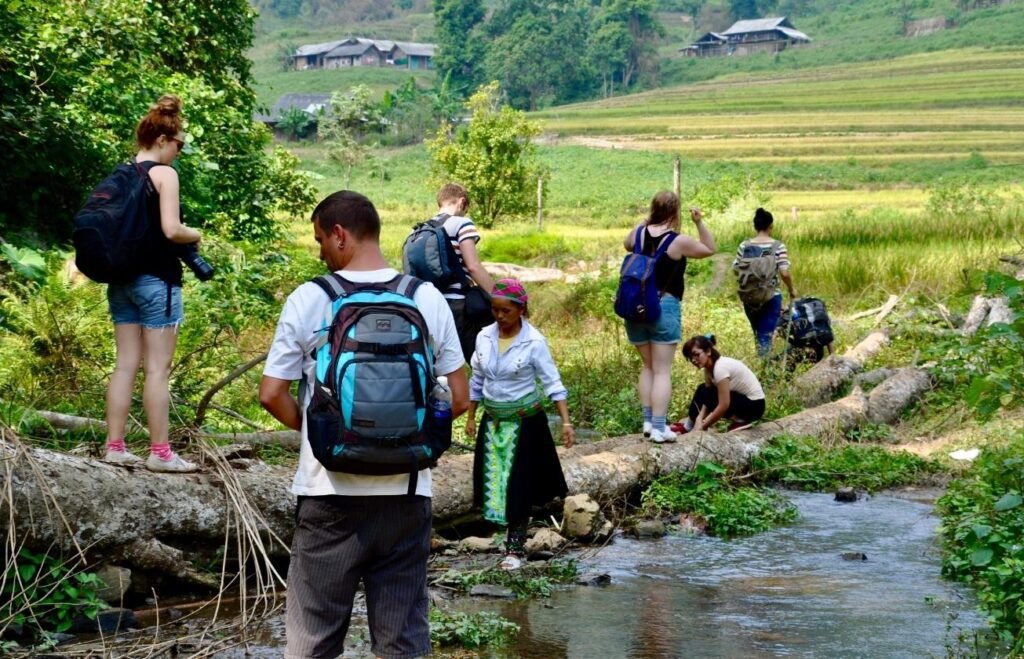

Farm Stays and Organic Agriculture Workshops
Connect with the land by participating in agri-tourism. Rural areas around Da Lat, Moc Chau, and the Mekong Delta are becoming hubs for organic farm stays. You can spend a few days living in a rustic eco-lodge, helping out on an organic farm, learning how to harvest tea or coffee, and enjoying delicious, farm-to-table meals. It’s a wonderful way to understand the importance of sustainable agriculture and enjoy a zero-waste lifestyle.
Low-Impact Cycling & Kayaking
Reduce your carbon footprint by choosing human-powered transport. Cycling through the rice paddies of Ninh Binh or the tranquil villages around Hoi An offers an intimate perspective of the landscape. Similarly, choosing to explore Lan Ha Bay or parts of Ha Long Bay by kayak instead of a large, noisy cruise ship minimizes pollution and allows you to access hidden lagoons and quiet beaches that larger boats cannot reach.
Craft Workshops with Local Artisans
Help preserve Vietnam’s rich cultural heritage by participating in a hands-on craft workshop. This is a fantastic form of responsible travel Vietnam, as it provides a valuable income stream for artisans and helps keep their traditions alive. In places like Hoi An, you can learn to make silk lanterns from a family that has been doing it for generations. Come to Hue, you can try your hand at making conical hats or traditional incense. In the highlands near Sapa, you can join workshops to learn about the ancient art of indigo dyeing from H’mong artisans.
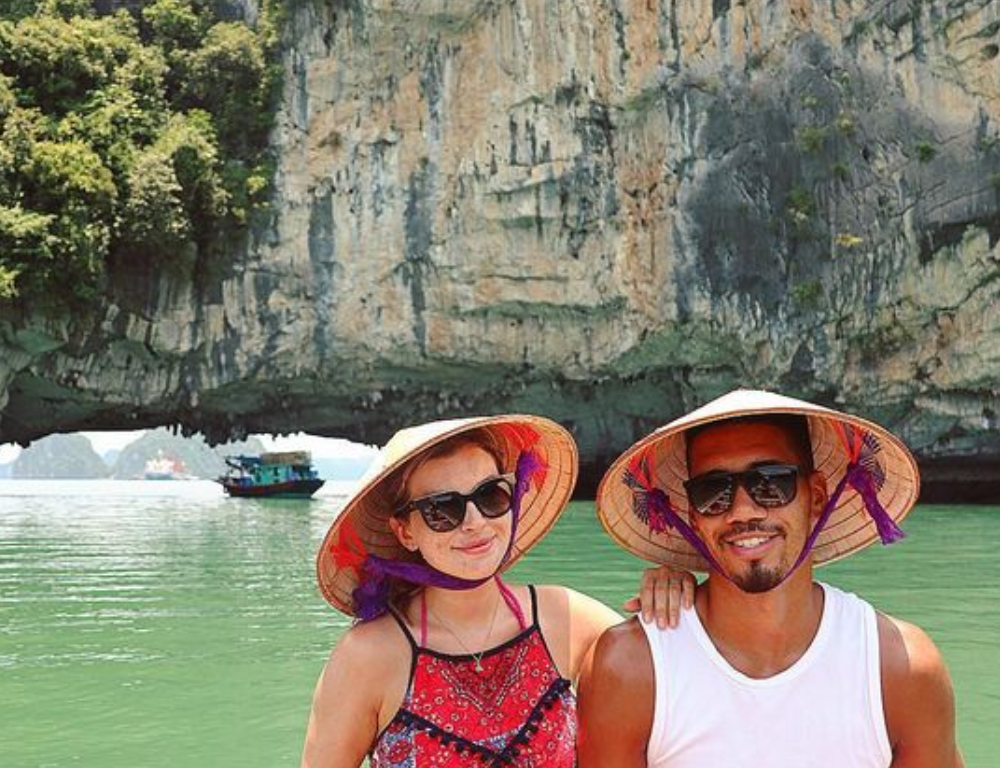

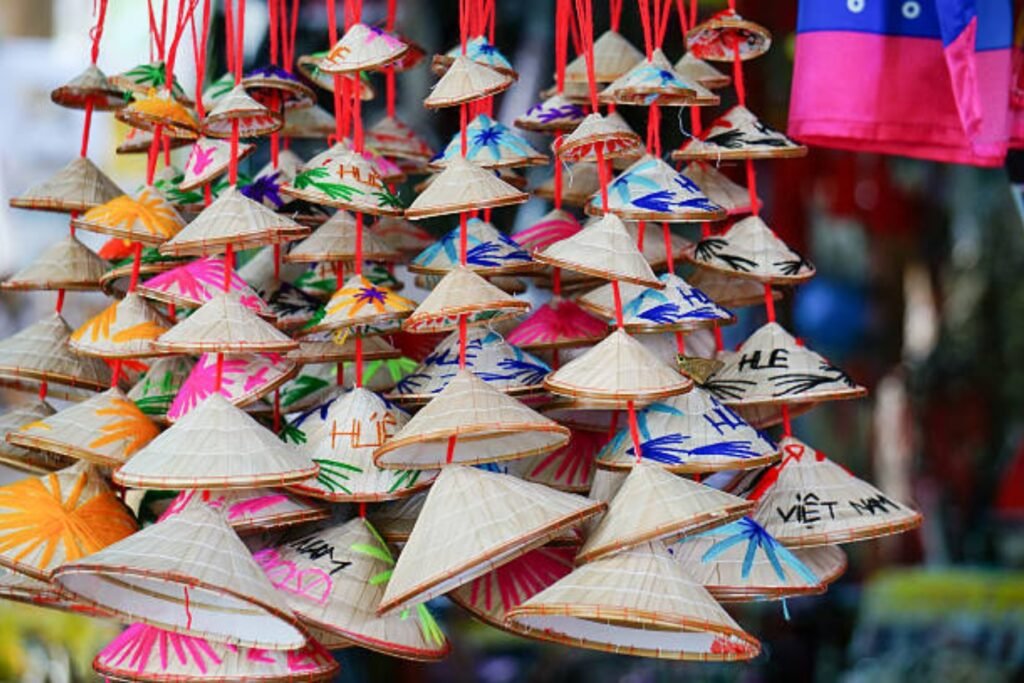

Volunteer & Conservation Projects
For travelers with more time, engaging with a local NGO can be an incredibly rewarding experience. Legitimate opportunities exist in wildlife rescue centers (like those in Cuc Phuong), reforestation projects, and English teaching programs in rural communities. However, it’s crucial to thoroughly vet any volunteer organization. Be wary of “volun-tourism” outfits that charge exorbitant fees for short-term, unskilled work. A genuine organization will have a clear mission, transparent financials, and focus on long-term, sustainable impact.
Expert Insight: Why Sustainable Travel Matters in Vietnam
“Vietnam is at a crucial tipping point. Mass tourism has brought economic benefits, but it has also placed immense pressure on our natural and cultural resources. Sustainable tourism Vietnam isn’t just a niche—it’s the only viable path forward. When a traveler chooses an eco-lodge over a concrete hotel, participates in a community-led tour, or simply refuses a plastic bag, they are casting a vote for the future they want to see. They are helping to preserve the very magic that drew them here in the first place.” — Ms. Lan Anh, Head of Sustainable Development at Sun Getaways Travel
Practical Tips for Eco-Conscious Travelers
Making small, conscious changes in your travel habits can have a big collective impact. Follow these practical tips for Vietnam green travel.
Pack Light, Reusable, and Local
- Carry a Reusable Water Bottle: This is the single most effective way to reduce plastic waste. A bottle with a built-in filter, such as a Grayl GeoPress or a Lifestraw bottle, is an excellent investment, allowing you to safely drink tap water.
- Bring Reusable Utensils & Bags: A compact set of bamboo utensils, a reusable coffee cup (for Vietnam’s amazing coffee!), and a foldable cloth tote bag for shopping will help you refuse countless single-use plastic items.
- Use Solid Toiletries: Shampoo bars, conditioner bars, and solid toothpaste reduce plastic packaging, are lighter to carry, and eliminate the risk of spills in your luggage.
Choose Eco-Certified & Responsible Lodging
Look for hotels, resorts, and homestays that are transparent about their sustainable practices. In Vietnam, look for certifications like the “Green Lotus” label. Check their website for specific policies on water conservation, energy use, waste management, and community employment. Some truly dedicated eco-lodges even have a “community benefit levy,” where a small percentage of your room rate goes directly to a local village development fund.
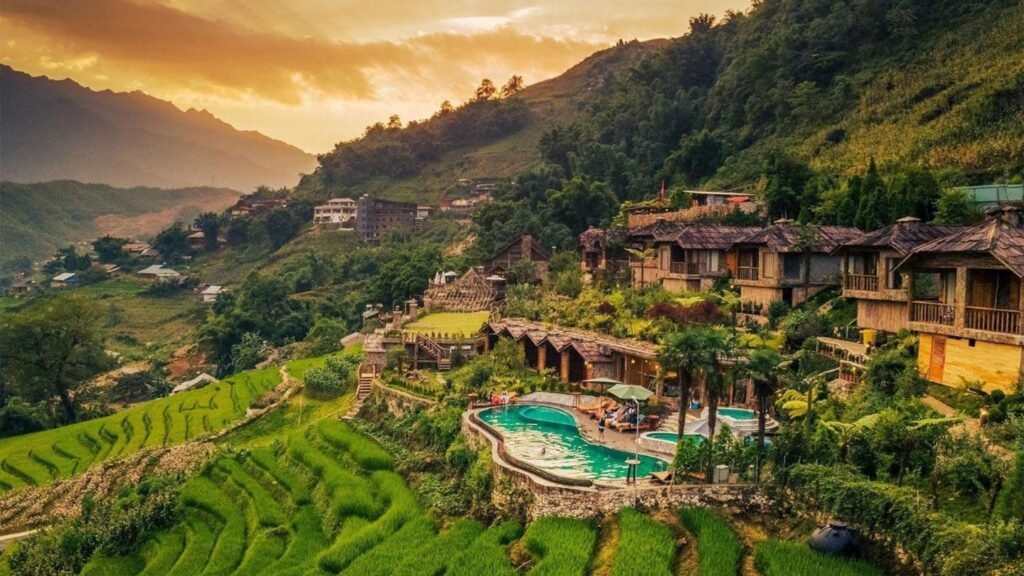

Travel Slowly, Stay Longer, and Use Greener Transport
Slow travel is a cornerstone of Vietnam eco-friendly tourism. Instead of rushing through five cities in ten days, consider spending more time in fewer places. This not only reduces your transportation carbon footprint but also allows for a deeper, more meaningful connection with each destination. You’ll have time to discover a favorite local cafe, build a rapport with a market vendor, and move beyond a superficial tourist experience. For long-distance travel, consider the overnight train as a scenic and eco-friendly alternative to a short-haul flight.
Respect Cultural Norms and the Natural Environment
- Dress Respectfully: When visiting temples, pagodas, or rural villages, cover your shoulders and knees. This simple act is a significant sign of respect.
- Ask Before You Snap: Always ask for permission before taking close-up photos of people, especially elders and children. A simple gesture and a smile go a long way.
- Stay on the Trail: During any form of eco-tourism Vietnam trekking or hiking, always stay on marked trails to avoid damaging fragile flora and disturbing wildlife habitats.
Challenges and the Road Ahead
While sustainable tourism Vietnam is growing, the country faces real challenges on its path to becoming a truly green destination.
- Overtourism: Certain hotspots like Sa Pa town, parts of Ha Long Bay, and Hoi An’s Ancient Town are struggling with the impacts of unmanaged visitor numbers, leading to strain on infrastructure and a dilution of the authentic Vietnam travel experience.
- Plastic Pollution: Plastic waste remains a significant problem, particularly in coastal and riverine areas. While government and community initiatives are underway, traveler participation in reducing consumption is crucial.
- Greenwashing: As sustainability becomes more popular, some businesses use “eco-friendly” as a marketing buzzword without implementing real, meaningful practices. As a traveler, learn to spot the signs. Does the company offer specifics, or just vague terms? Do they name their community partners? Do their tour photos show small, respectful groups or large, disruptive ones?
Your role is to be a discerning consumer. Look beyond the marketing slogans. By rewarding businesses genuinely committed to ethical travel Vietnam, you help drive the entire industry in the right direction.
Frequently Asked Questions (FAQs)
Q1: What is the best time to explore Vietnam sustainably?
A: The shoulder seasons (April–June and September–November) are often ideal. The weather is generally pleasant, and there are fewer crowds. Traveling off-peak helps reduce the strain of overtourism and often leads to more meaningful interactions. This is a key strategy for Vietnam green travel.
Q2: How can I know if a tour is genuinely eco-friendly?
A: Look for transparency and specifics. A genuine eco-tour operator will detail their environmental policies, highlight their partnerships with local communities, maintain small group sizes, and actively minimize waste. A commitment to responsible travel Vietnam should be evident in their operations, not just their marketing.
Q3: Is public transport in Vietnam eco-friendly?
A: Relatively speaking, yes. The national train system is one of the most eco-efficient ways to travel long distances. Intercity buses are a shared, lower-carbon option. In cities like Hanoi and Ho Chi Minh City, the growing network of public and electric buses offers a green alternative for urban transport.
Q4: What should I avoid to travel sustainably in Vietnam?
A: Avoid any form of tourism that exploits people or animals. This includes elephant rides and wildlife performances. Do not buy souvenirs made from wildlife products like ivory, coral, or turtle shells. Be wary of tours that seem unusually cheap, as they may be cutting corners by underpaying local staff. True ethical travel Vietnam prioritizes the well-being of all.
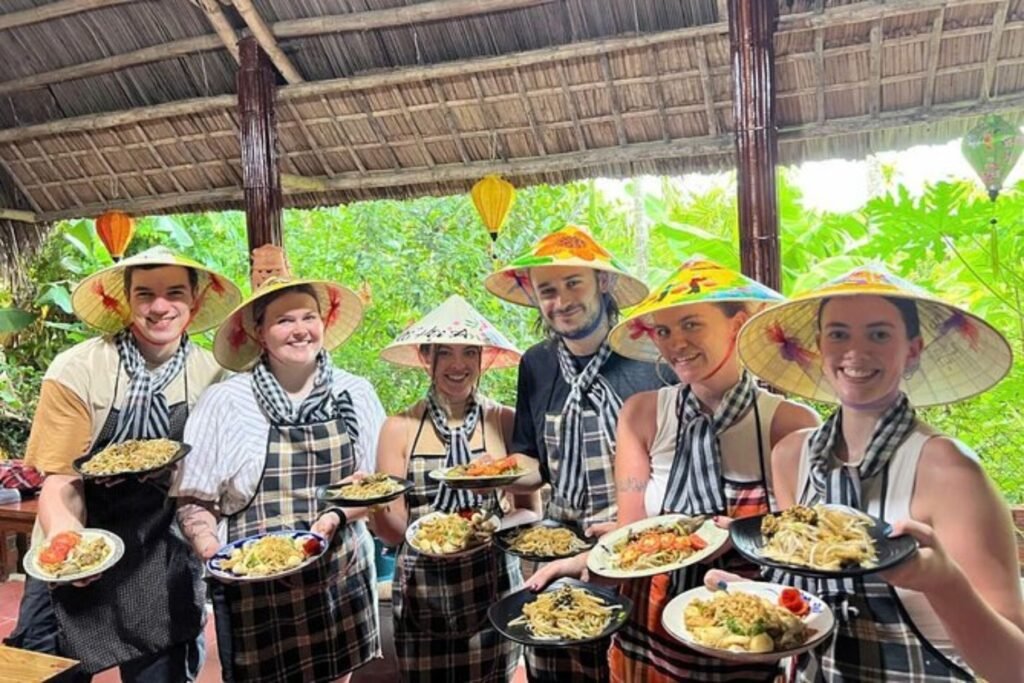

Call to Action: Make Your Trip Count
Vietnam is more than just stunning views; it’s a living, breathing cultural and ecological treasure. As a traveler, your choices have power. When you opt for a homestay in the Ha Giang mountains, choose a reusable bag at the local market, or take the time to learn about the conservation work at a national park, you are doing more than just traveling—you are becoming a steward of the place you’ve come to admire. You are actively participating in sustainable tourism Vietnam.
Your journey can be a force for good. Choose green. Travel slow. Connect deeply. Be a part of a movement that values Vietnam not as a product to be consumed, but as a partner in creating a more sustainable and beautiful world.
Ready to embark on a journey with purpose? Explore our specially curated sustainable Vietnam tours, or contact our specialists to design your own unforgettable eco-friendly adventure!
About the Author
Emma is the Head of Sustainable Development at Sun Getaways Travel and a passionate advocate for community-based tourism. Born in the Mekong Delta and having spent years working with ethnic minority communities in the northern highlands, Emma has a deep, personal understanding of Vietnam’s cultural and ecological diversity. She dedicates her work to designing travel experiences that are not only breathtaking for visitors but also empowering for local communities, ensuring that the principles of responsible travel Vietnam are at the core of everything we do.
Why Trust Us?
At Sun Getaways Travel, we believe that the most beautiful journeys are those that leave a positive legacy. Sustainable tourism Vietnam is not just a category of tours for us; it is the guiding philosophy behind our entire operation.
- Local Partnerships: We build long-term, equitable partnerships with local guides, family-run homestays, and community cooperatives. We don’t just work with them; we grow with them.
- Vetted for Impact: Every experience we offer is rigorously vetted not only for quality and safety but also for its environmental and social impact. We champion Vietnam eco-friendly tourism in action.
- Authentic Connection: Our goal is to facilitate genuine connection. We design itineraries that take you beyond the surface to experience the real culture and heart of the country, offering true authentic Vietnam travel.
- Transparency: We are committed to being open about our practices and the challenges of sustainability. We believe an informed traveler is an empowered one, and we’re here to be your trusted partner in planning a journey that aligns with your values.
Ask a question
Leave a Comment (0)
No questions yet. Be the first to ask a question!











